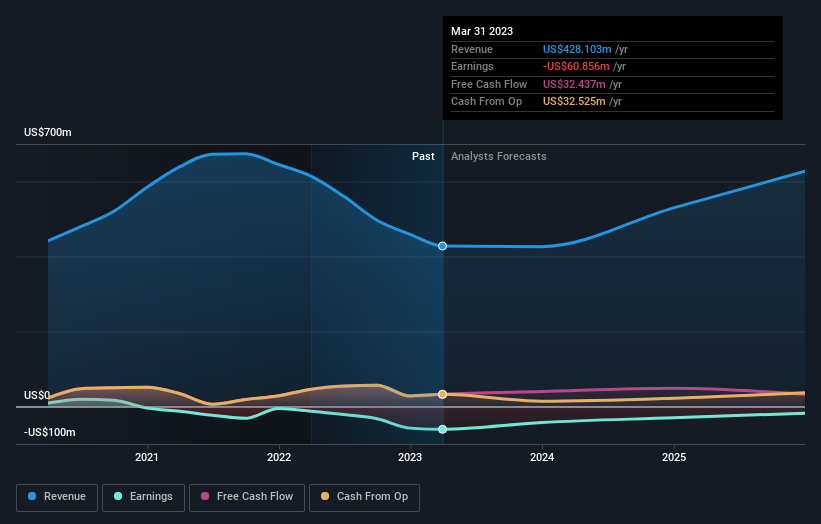MediaAlpha, Inc. (NYSE:MAX) Analysts Are Reducing Their Forecasts For This Year
Market forces rained on the parade of MediaAlpha, Inc. (NYSE:MAX) shareholders today, when the analysts downgraded their forecasts for this year. Both revenue and earnings per share (EPS) estimates were cut sharply as the analysts factored in the latest outlook for the business, concluding that they were too optimistic previously.
Following this downgrade, MediaAlpha's eight analysts are forecasting 2023 revenues to be US$426m, approximately in line with the last 12 months. Losses are predicted to fall substantially, shrinking 32% to US$0.93. Yet prior to the latest estimates, the analysts had been forecasting revenues of US$512m and losses of US$0.65 per share in 2023. So there's been quite a change-up of views after the recent consensus updates, with the analysts making a serious cut to their revenue forecasts while also expecting losses per share to increase.
See our latest analysis for MediaAlpha

The consensus price target fell 30% to US$12.86, implicitly signalling that lower earnings per share are a leading indicator for MediaAlpha's valuation. That's not the only conclusion we can draw from this data however, as some investors also like to consider the spread in estimates when evaluating analyst price targets. Currently, the most bullish analyst values MediaAlpha at US$16.00 per share, while the most bearish prices it at US$7.00. This is a fairly broad spread of estimates, suggesting that the analysts are forecasting a wide range of possible outcomes for the business.
Of course, another way to look at these forecasts is to place them into context against the industry itself. We would also point out that the forecast 0.6% annualised revenue decline to the end of 2023 is better than the historical trend, which saw revenues shrink 1.7% annually over the past three years By contrast, our data suggests that other companies (with analyst coverage) in a similar industry are forecast to see their revenue grow 9.7% per year. So it's pretty clear that, while it does have declining revenues, the analysts also expect MediaAlpha to suffer worse than the wider industry.
The Bottom Line
The most important thing to take away is that analysts increased their loss per share estimates for this year. Unfortunately analysts also downgraded their revenue estimates, and industry data suggests that MediaAlpha's revenues are expected to grow slower than the wider market. Given the scope of the downgrades, it would not be a surprise to see the market become more wary of the business.
So things certainly aren't looking great, and you should also know that we've spotted some potential warning signs with MediaAlpha, including dilutive stock issuance over the past year. Learn more, and discover the 3 other concerns we've identified, for free on our platform here.
Another way to search for interesting companies that could be reaching an inflection point is to track whether management are buying or selling, with our free list of growing companies that insiders are buying.
New: Manage All Your Stock Portfolios in One Place
We've created the ultimate portfolio companion for stock investors, and it's free.
• Connect an unlimited number of Portfolios and see your total in one currency
• Be alerted to new Warning Signs or Risks via email or mobile
• Track the Fair Value of your stocks
Have feedback on this article? Concerned about the content? Get in touch with us directly. Alternatively, email editorial-team (at) simplywallst.com.
This article by Simply Wall St is general in nature. We provide commentary based on historical data and analyst forecasts only using an unbiased methodology and our articles are not intended to be financial advice. It does not constitute a recommendation to buy or sell any stock, and does not take account of your objectives, or your financial situation. We aim to bring you long-term focused analysis driven by fundamental data. Note that our analysis may not factor in the latest price-sensitive company announcements or qualitative material. Simply Wall St has no position in any stocks mentioned.
About NYSE:MAX
MediaAlpha
Through its subsidiaries, operates an insurance customer acquisition platform in the United States.
Very undervalued with reasonable growth potential.
Similar Companies
Market Insights
Community Narratives


Recently Updated Narratives


No miracle in sight


Q3 Outlook modestly optimistic


Alphabet: The Under-appreciated Compounder Hiding in Plain Sight
Popular Narratives


The company that turned a verb into a global necessity and basically runs the modern internet, digital ads, smartphones, maps, and AI.


MicroVision will explode future revenue by 380.37% with a vision towards success



